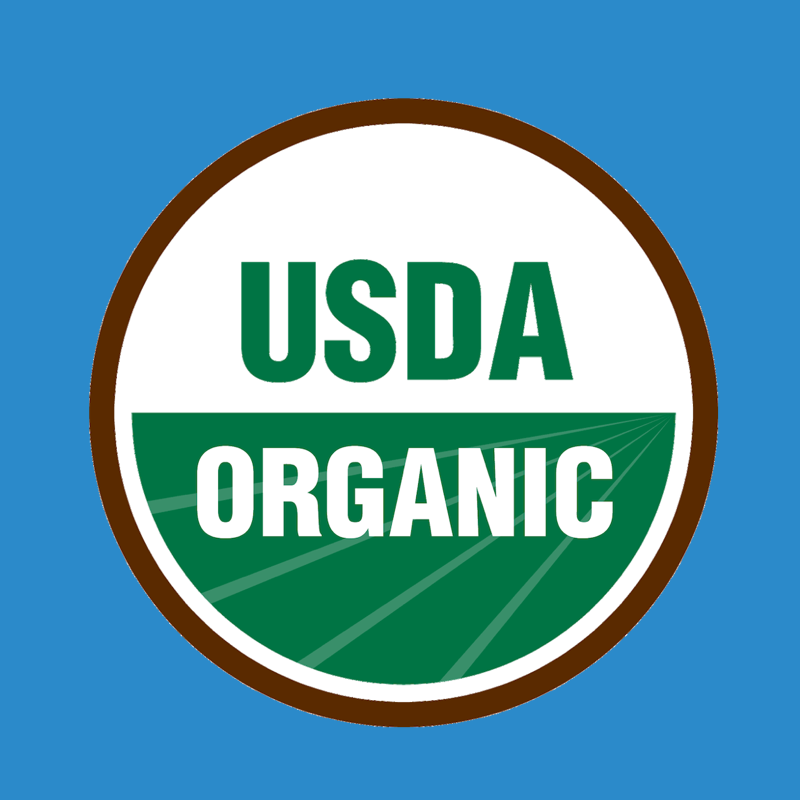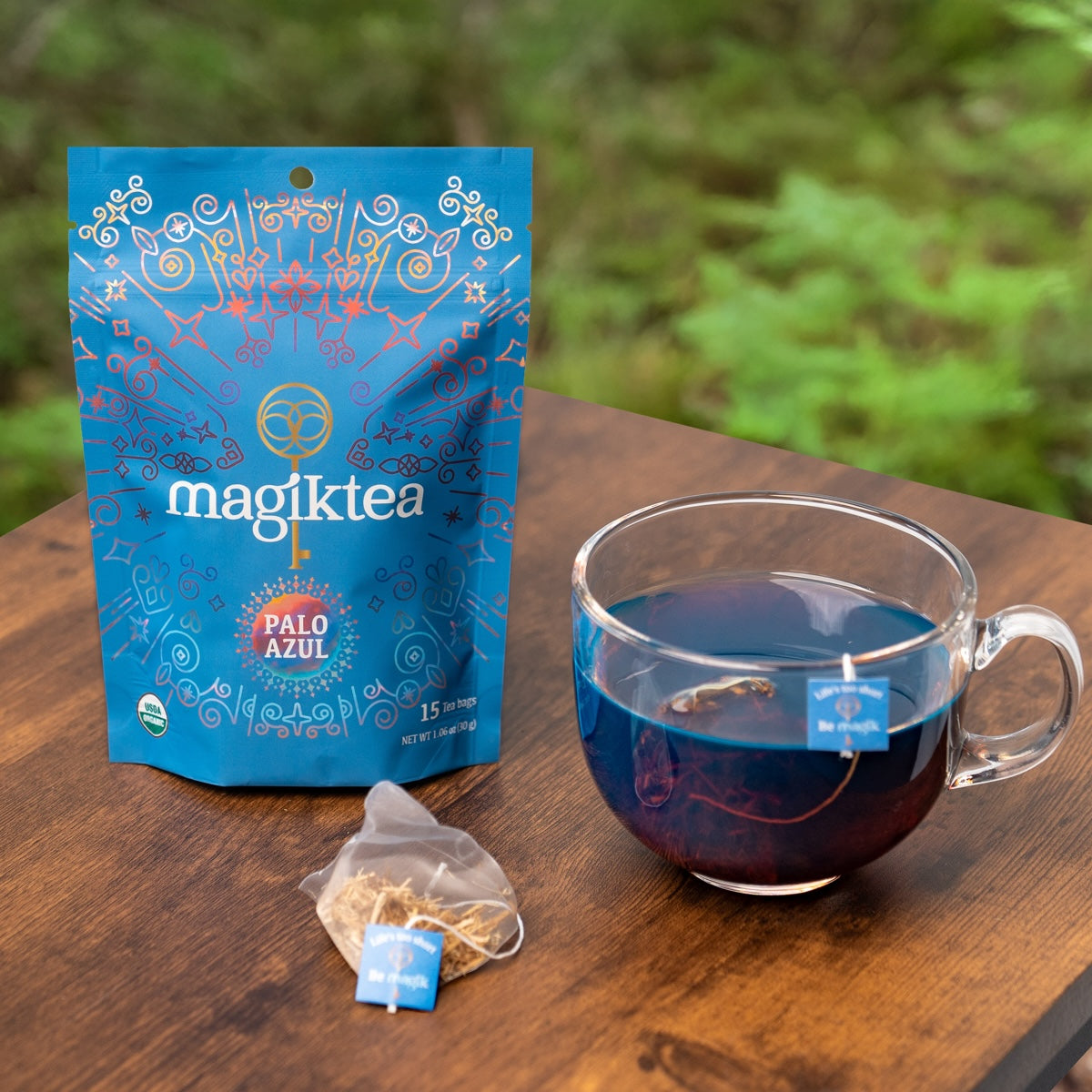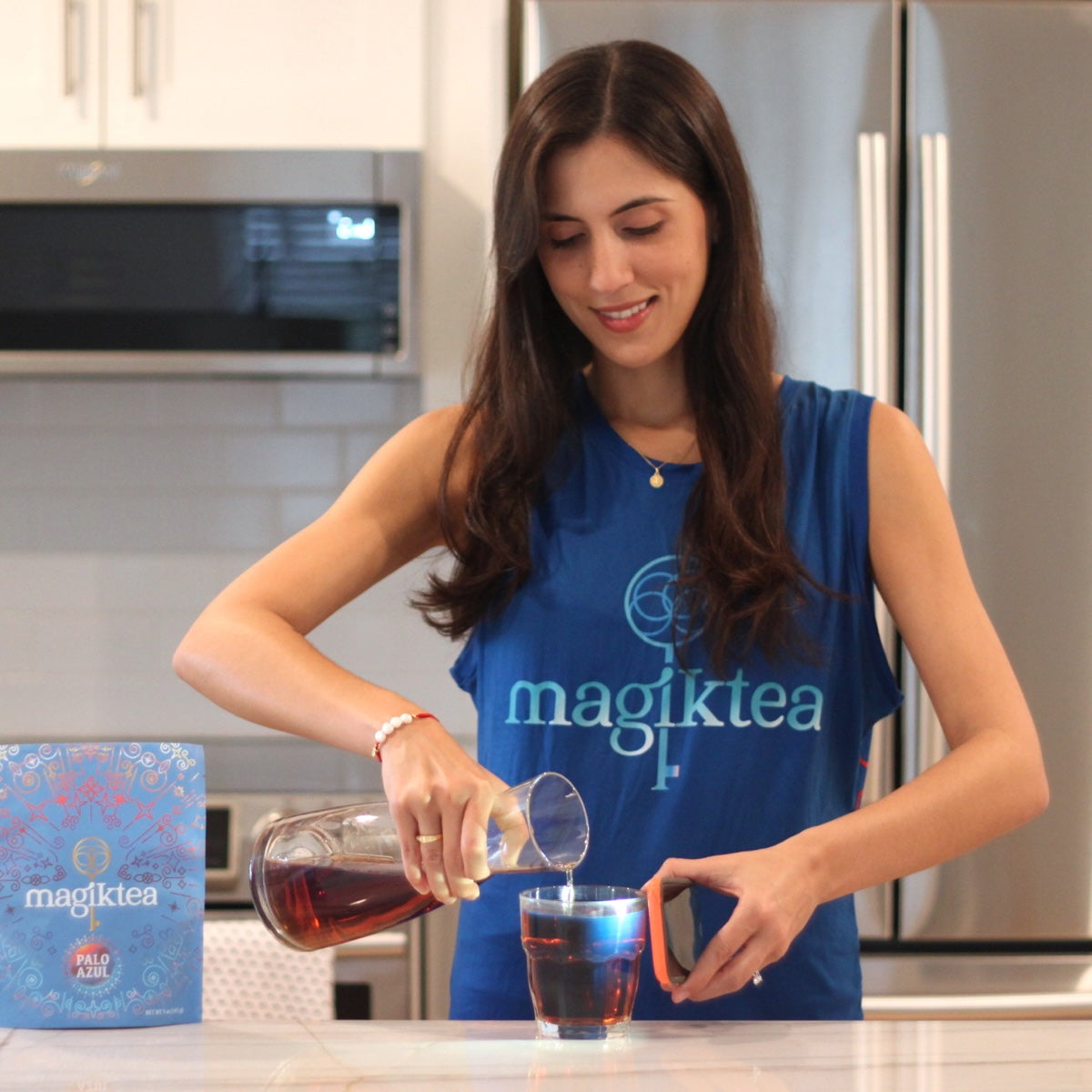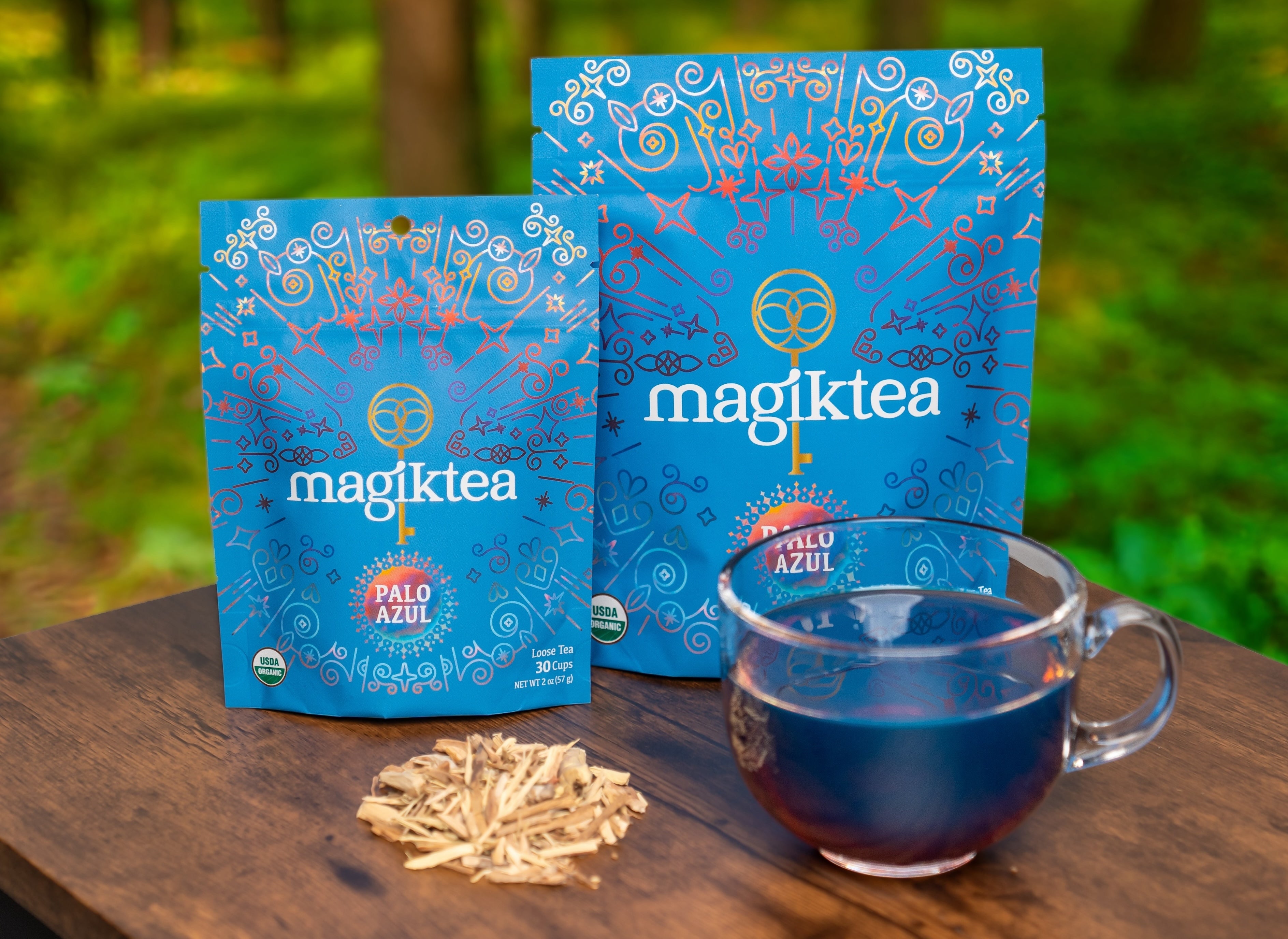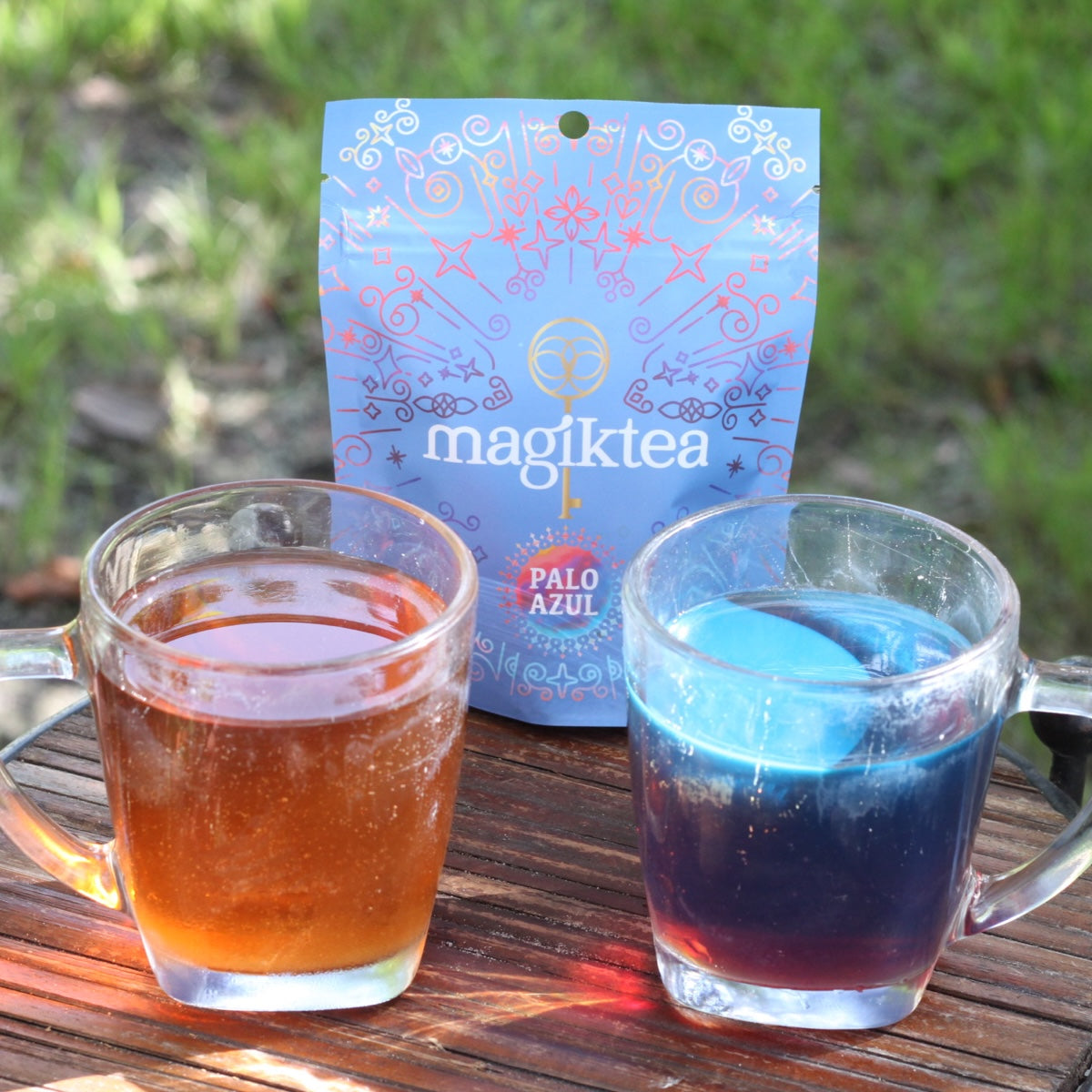Our mission is to share the highest quality palo azul with the world so that everyone can enjoy this magical tea. We also know that organic agriculture is better for the environment, the farmers, our health and the sustainable propagation of plants. This is why we partnered with a supplier that is USDA Organic Certified to provide the world with a palo azul that is nutrient-dense, harmoniously cultivated, and free from toxic chemicals used in non-organic farming.
Our palo azul trees grow and blossom naturally, and there’s no irrigation, pesticides, or synthetic fertilizers because the entire land (pictured below) has been USDA Organic Certified since 2009.

Being certified organic means that our supplier complies with the following requirements:
- The ranch is managed completely free of herbicides, pesticides, artificial fertilizers, or any other synthetic additives.
- Absolute prohibition of the use of genetically modified organisms.
- Raising livestock in free-range and open-air systems and nourishing them with organic feed
- Broad crop rotation as a prerequisite for effective on-site resource use.
- Choosing plant and animal species that are resistant to diseases and adapted to local conditions.

Grown Symbiotically & Naturally From Seeds
Our palo azul trees have been growing symbiotically & naturally from seeds for decades, so the roots go deep into the earth and that’s where all the nutrients and trace minerals come from. What you’re getting isn’t just any wood, this is ancient nutrition that is the culmination of centuries of evolution from Mother Earth.

Deeper Roots = Centuries of Nutrition
Deeper roots extract more nutrients and organic practices allow the trees to overcome stress, which helps them become more resilient and nutritious. This is due to the principle of xenohormesis, where humans can benefit from the stress-induced nutrients produced by plants and essentially piggyback off of their sophisticated defense mechanisms that they evolved through millennia.
In non-organic farming, most trees are not grown from seeds and instead, many are propagated using branches (cuttings). This causes the roots to grow sidewards and the plants have to compete for topsoil, so conventional farming requires pesticides to kill the competition. This depletes the topsoil and it leaves the plants on chemical life support because they’re dependent on synthetic fertilizers to survive.
 Pesticides = Weak Plants = Less Nutritious
Pesticides = Weak Plants = Less Nutritious
Non-organic farming leads to weakened plants with no defense mechanisms against insects, pests, fungi, mold, and it is well known that stressed plants are more nutrient dense because of the principle of xenohormesis. This is why non-organic farming requires pesticides, herbicides, insecticides, and fungicides to kill everything so that the weakened plants can survive.
Just the way nature intended.
Our palo azul trees require zero human intervention until harvest. The trees grow symbiotically with all its surroundings and when organisms die, they decompose and enrich the earth so that new life can blossom. Just the way nature intended.

Wildlife Friendly Certified
Our supplier is also Wildlife Friendly Certified and they're enrolled in Mexico's Federal Program for National Natural Protected Areas, so we're committed to the conservation of all species in the region.
Below you can see the palo azul trees and this is the 12,000 acre natural reserve in Mexico where we source palo azul. We harvest the palo azul sustainably by pruning the branches, which encourages the tree to grow even bigger and it adds more life to the land, so everyone can enjoy nature’s magic!

Would you rather drink tea sprayed with chemicals or one that grows harmoniously as nature intended?
Most people know that organic is better, but it’s also more expensive...so are the benefits worth it? We think they are, especially after researching all the evidence. In summary, the studies show that organic is better because they have no pesticides, less heavy metals, more antioxidants and they're also better for farmers, the environment, and the sustainable agriculture of plants!
Firstly, what classifies as organic? The key difference between organic and non-organic products, according to the U.S. Department of Agriculture, is that organic crops must be grown without the use of synthetic herbicides, pesticides, and fertilizers, or genetically modified organisms (GMOs).
What are the benefits of going organic?
1. No Pesticides

The main benefit is that organic products don’t have synthetic pesticides which may have deleterious health effects. A study published by UC Davis mentions that “increased exposure to pesticides can lead to increased risk of ADHD and autism. Exposure to pesticides may lead to the development of Parkinson’s disease, fertility issues and cognitive decline later in life. There is also a potential link between cancer and pesticides.” Moreover, the International Agency for Research on Cancer classified three common pesticides as carcinogenic.
A 2018 study also found that “a significant reduction in the risk of cancer was observed among high consumers of organic food.” Another study tested 18 samples from Chinese tea companies and found that 12 of the 18 samples contained “at least one pesticide banned for use on tea. Pesticides like methomyl and endosulfan, the latter of which has been banned globally under the Stockholm Convention due to its toxic properties.”
2. More Antioxidants

A 2014 study published by Newcastle University found that “organic crops are up to 60% higher in a number of key antioxidants than conventionally-grown ones.”
Another study published in the British Journal of Nutrition found that “concentrations of a range of antioxidants such as polyphenolics were found to be substantially higher in organic crops/crop-based foods, with those of phenolic acids, flavanones, stilbenes, flavones, flavonols and anthocyanins."
The authors of this study also “found that concentrations of antioxidants such as polyphenolics were between 18-69% higher in organically-grown crops."
Lastly, a 2017 study demonstrated that “organic tea had significantly higher concentrations of key catechins linked to tea quality." Catechins are polyphenolic compounds which have antioxidative properties.
3. Less Heavy Metals

Not that type of heavy metal! 🤘😉 Organic products have lower levels of toxic heavy metals. The British Journal of Nutrition study showed “significantly lower levels of toxic heavy metals in organic crops. Cadmium, which is one of only three metal contaminants along with lead and mercury for which the European Commission has set maximum permitted contamination levels in food, was found to be almost 50% lower in organic crops than conventionally-grown ones.” Moreover, they found that “the frequency of occurrence of pesticide residues was found to be 4 times higher in conventional crops.”
4. No GMOs

Conventional farming practices use synthetic fungicides, herbicides, and insecticides which remain in the teas that we drink. This is why many plants are bioengineered to make them resistant to these synthetic pesticides. Some of the most common GMOs in the U.S. are corn, soybeans, and canola.
The FDA regards GMOs as safe, but some studies suggest that “GMO’s may cause internal organ damage, slowed brain growth, and thickening of the digestive tract” and they’ve been “linked to increased food allergens and gastrointestinal problems in humans.” This is why it's important to rinse non-organic produce and peel the skin in order to remove some of the pesticides.
Is Organic the same as Non-GMO or “Natural”?
All organic produce is non-GMO by the USDA’s definition of what classifies as organic. But not all non-GMO products are organic, because even though they have no bioengineered organisms, they still may be cultivated with non-organic pesticides.
The word “natural” on product labels simply means that the products have no artificial sweeteners, flavors, colors, or preservatives. This doesn’t necessarily mean that the ingredients were cultivated organically.
5. Better for Farmers and the Environment

Now that you know how harmful these synthetic pesticides, heavy metals, and GMOs can be...imagine how unhealthy it must be for the farmers and the local communities who are cultivating these plants! Non-organic tea cultivation is one of the most environmentally devastating practices in Asia because the chemicals used in farms can spread to rivers, oceans, forests, etc. These chemicals and heavy metals can pollute and kill crops, plants, and even animals in nearby ecosystems.
As time goes on and insects become more immune to pesticides, farmers are required to use even stronger chemicals which kill beneficial organisms and nutrients in the soil, making it even harder for tea plants to grow naturally. This leads to a vicious cycle of more bioengineering, more pesticides, more environmental damage, and more damage to the health of the farmers, the local communities, and the consumers who eventually drink all these chemicals.

Whereas non-organic tea is grown in a “mono-crop” that is solely focused on the mass production of one plant and ends up stripping nutrients and organisms from ecosystems... Organic farmers grow multiple crops in a single field to promote biodiversity so that other animals and plants can flourish along with the tea. They are stewards of nature who work harmoniously with a philosophy of permaculture to deal with pests in a natural way.
Going organic isn’t just about your health...
It’s about the health of farmers and our planet. This is why we only source organic palo azul, just how nature intended it! No action is too small to make a difference in the world. So help us share this message with others so that we can all make the world a more magical place.
Other Information about Organic
Dirty Dozen & Clean 15
If you don’t want to break the bank by buying everything organic, here’s the Dirty Dozen list which is published each year by the Environmental Working Group (EWG). It shows the foods which are most likely to contain pesticides, so these foods should be on your organic priority list.
Dirty Dozen: Apples, celery, cherry tomatoes, cucumbers, grapes, nectarines, peaches, potatoes, snap peas, spinach, strawberries, and sweet bell peppers.
The EWG also has a list called the Clean 15, which lists the foods that are least likely to contain pesticide residues.
Clean 15: Asparagus, avocados, cabbage, cantaloupe, cauliflower, eggplant, grapefruit, kiwi, mangoes, onions, papayas, pineapples, sweet corn, sweet peas, and sweet potatoes.
What Products Can Have the USDA Seal?
The only products that are allowed to have the USDA Organic Seal are those that are made with at least 95% organic ingredients. If a product label says “made with organic”, then it has at least 70% organic ingredients. If it says “organic ingredients”, then it has less then 70% organic ingredients.
Sources
(2018) Association of Frequency of Organic Food Consumption With Cancer Risk
Organic Foods: What You Need to Know
UC Davis: Are Organic Foods Really Healthier?
Harvard: Should You Go Organic?
Mayo Clinic: Organic Foods: Are They Safer? More Nutritious?


